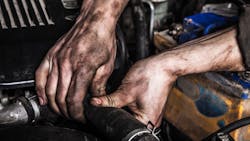In the mid ‘90s at my suburban Cleveland, Ohio, high school, shop class was a joke. Those who enrolled in those courses loved it as it was a place where lax teachers let students goof off and sometimes make a crummy birdhouse or ash tray. The administrators likely valued it as a holding pen for all the future blue-collar grunts to languish while the studious little college-prep kids fervently analyzed the Age of Enlightenment or read Wuthering Heights.
The funny thing is all kids in all classes goof off, and at least the kids in auto shop understood some basic DIY skills and learned how to change a tire. Meanwhile, I couldn’t make it through a few chapters of those boring British “classics,” while they were learning skills that could provide them a solid income for their entire careers.
As of 2020, auto technicians' median pay (as of 2020) was $47,620, and $50,200 for diesel techs, according to the U.S. Bureau of Labor Statistics. Many fleets have substantially increased pay since then. Some larger fleets are giving entry-level techs up to $62,000, according to New Village Institute, a new auto and diesel training school that opened this year in Blairsville, Pennsylvania.
Funnier still, I really thought college was the only path to success, as that was the approved propaganda of the time, as disseminated by parents, teachers, and media. As my family was broke, and I had an aversion to debt, I joined the military to get college money. It was brutally hard work, occasionally a grand adventure, and I learned an appreciation for dirty workers while cleaning out ballast tanks and sopping up hydraulic (and worse) fluids. Not enough to go into the trades, though. I used my G.I. Bill money on a journalism degree—just as the recession hit and that industry crumbled. Womp womp. I worked two jobs just to make ends meet for damn near a decade.
At the same time, one of my best friends since kindergarten, who never got good grades and was written off by teachers as a loser but excelled in auto shop, used that time to work his way up from quick service joints to larger service centers. He’s now an ASE-certified master diagnostic technician at an auto dealership. He and his wife and three kids live comfortably, and also took in his three nephews after their mother passed. This was made possible by that master mechanic salary—and no student loan debt. Over the years, he’s fixed up thousands of struggling friends’ and acquaintances’ junkers on the side for free or at a big discount. He was the best man at my wedding and one of the greatest men I know. Being a technician helped him become that.
There’s another great man I know—or at least interviewed once—named Mike Rowe, who hears stories like this all the time. The host of Dirty Jobs and several other shows has become the trades’ most effective champion through his peerless storytelling, biting humor, and knack for using common sense. Since 2008, he has also fronted mikeroweWORKS Foundation, which offers a scholarship program for the skilled trades that emphasizes work ethic over grades. The non-profit has awarded 1,400 trade school hopefuls a total of $5.2 million so far.
Rowe’s journey is too long to detail here, and it’s best to hear him tell it, but at the Virtual Diesel Expo, hosted by Diesel Laptops and Alliant Power, he provided his own high school musings in the late 1970s.
As a high school freshman, his school had woodshop, metal shop, auto shop, and welding clinics. “By the time I finished, it was all gone,” Rowe explained.
Rowe argued that the “boneheaded, inexplicable decision made 40 or 50 years ago to remove shop class from high school” was a root cause of the current skills gap. The U.S. Bureau of Labor Statistics projects that every year until 2030, the industry will need to fill about 28,000 diesel technician jobs annually.
Another cause of the current skilled trade shortage, and what worries Rowe, is that “most of the people in that industry right now are over 55, and they’re retiring faster than ever, and there’s nobody in the pipeline.”
See also: Mike Rowe on diesel tech shortage: ‘The math ain’t good’
Language has also detracted those under 55 from choosing a track in the trades over college, Rowe said. “Remember, back in the day, it used to be called the vocational arts. And the first thing we did was we took the art out of it and that just left ‘vocational training,’ which doesn’t sound quite as good,” he explained. “And then we hyphenated it to ‘vo-tech’… And then we changed it from vo-tech to shop. Then we walked around behind the barn and shot it in the head.”
I don’t know if keeping the “arts” in would have helped much, as those classes are usually the first to have funding cut. But I have seen the prestige of trades rise from joke professions to serious career paths in the last decade or so. And a lot of college graduates likely see their blue-collar friend living a lot better than they do. A local vocational arts institute called Polaris Career Center is so busy, there’s a waiting list for the heavy trades. The automotive repair track has three people waiting.
“Enrollment has very much gone up with all the news about the jobs and the stereotypes that aren’t so much anymore,” related Cindy Crisler, enrollment coordinator at Polaris for 11 years. “There’s definitely been an increase in interest in our programs. We’re getting a different kind of student, a better student.”
Maybe it’s not the students who changed for the better, but the adults, who probably now realize that when you need something done, one skilled friend with perpetually oil-stained hands is worth a dozen English majors who probably did read every page Wuthering Heights, if such a person exists.
And ideally, parents, teachers, and influencers of any kind will encourage the next generation to take a serious look at the trades, particularly working on commercial vehicle maintenance. Because without functioning trucks, America and its economy will become a laughingstock. Or at least more of one.
About the Author

John Hitch
Editor-in-chief, Fleet Maintenance
John Hitch is the award-winning editor-in-chief of Fleet Maintenance, where his mission is to provide maintenance leaders and technicians with the the latest information on tools, strategies, and best practices to keep their fleets' commercial vehicles moving.
He is based out of Cleveland, Ohio, and has worked in the B2B journalism space for more than a decade. Hitch was previously senior editor for FleetOwner and before that was technology editor for IndustryWeek and and managing editor of New Equipment Digest.
Hitch graduated from Kent State University and was editor of the student magazine The Burr in 2009.
The former sonar technician served honorably aboard the fast-attack submarine USS Oklahoma City (SSN-723), where he participated in counter-drug ops, an under-ice expedition, and other missions he's not allowed to talk about for several more decades.
